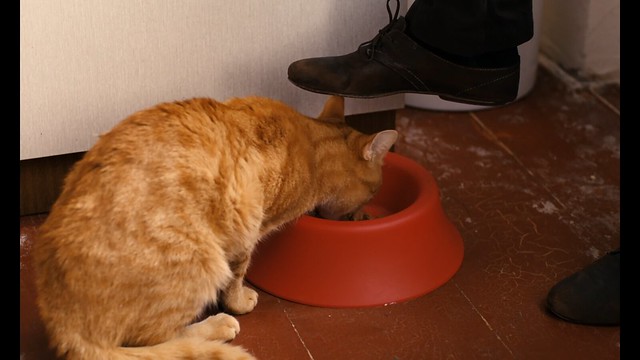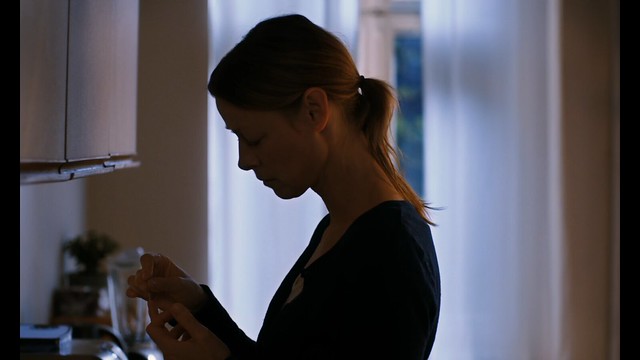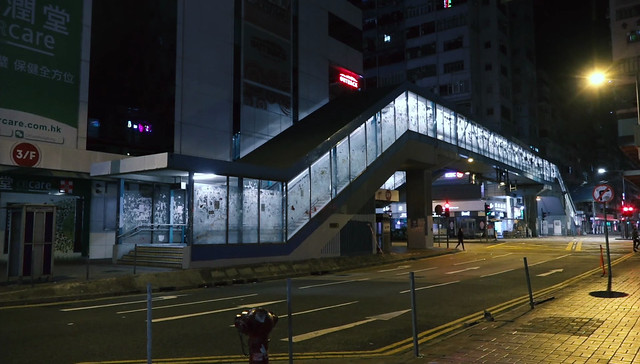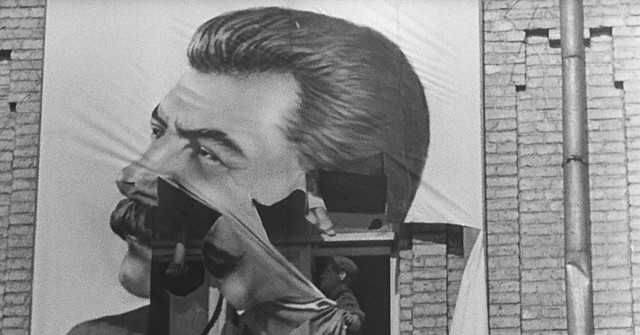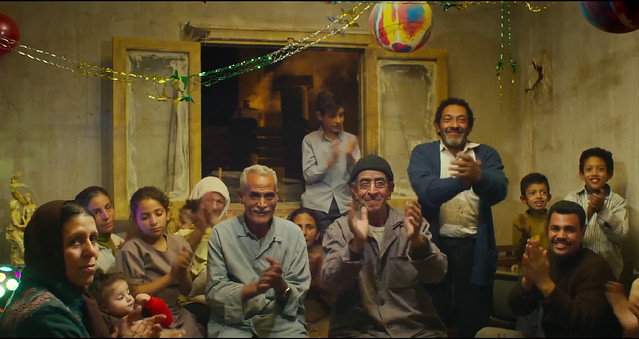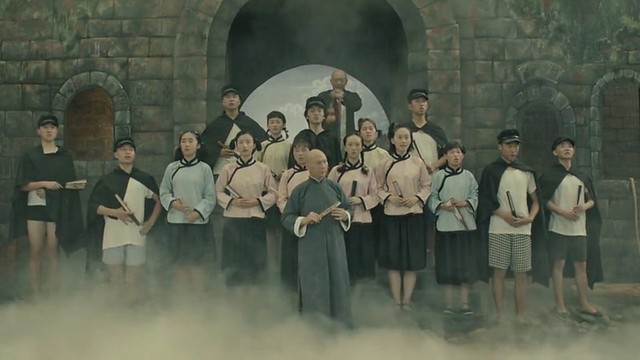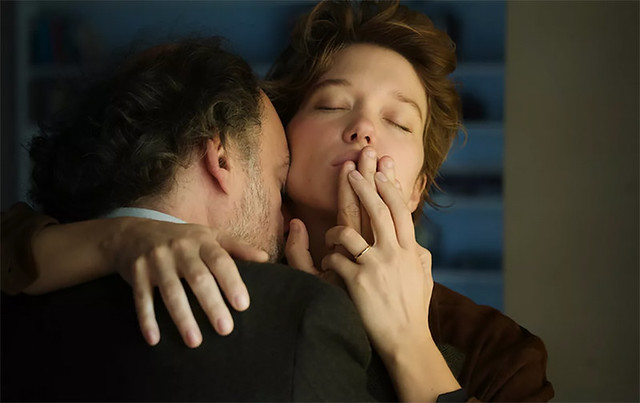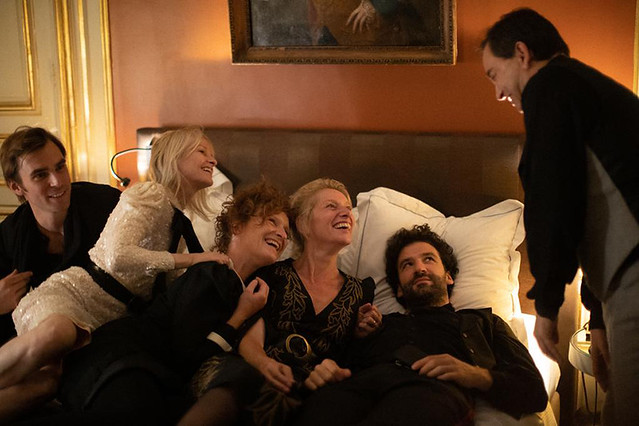 On the onset, a grown version of a 14-year old girl who died in 2008 tells that the film will travel space and time since in film medium, everything is possible. So starts lyrical staging of unspeakable grief and all the potential of what could have been. Terra, played by Schelby Jean-Baptist, witnesses her funeral, carries on imaginary conversations with her mom (Florence Blaine MBaye), a Haitian immigrant, first to Quebec, then to Connecticut, US.
On the onset, a grown version of a 14-year old girl who died in 2008 tells that the film will travel space and time since in film medium, everything is possible. So starts lyrical staging of unspeakable grief and all the potential of what could have been. Terra, played by Schelby Jean-Baptist, witnesses her funeral, carries on imaginary conversations with her mom (Florence Blaine MBaye), a Haitian immigrant, first to Quebec, then to Connecticut, US.
This House contemplates many things - the idea of home for both body and spirit, how the tragedy rips open a hole in space/time continuum, and giving voice to the voiceless/dead. The film consists of obvious indoor studio stagings, the lush greenery of the Haiti and its coastline and footage of bleak Northeast US footage all captured in grainy 16mm. Filmmaker Miryam Charles sort out a tough subject close to home with cinematic playfulness and poetic lyricism. This House is a poignant and compelling cinematic experience.
Train Again - Peter Tscherkassky
 From the beginning of motion picture with Lumière Brothers, trains and film have a long and intertwined history. With Train Again, the assemblage-film master Peter Tscherkassky painstakingly creates a thrilling cinematic cake, pulling clips from as far back as Lumière's, The Great Train Robbery, Ballet Mécanique, to The Spirit of the Behive, Shining to Hollywood B-action films. His usual technique - rapid cutting, erratic camera movement, repetition and flicker effects, Train Again tests your persistence of vision to a dazzling effect. With Dirk Scheafer's tension building score, the 20 minute long film works like a thrill ride just like Tscherkassky's previous works like Outer Space or Dream Work. You really want to see it on pristine film print.
From the beginning of motion picture with Lumière Brothers, trains and film have a long and intertwined history. With Train Again, the assemblage-film master Peter Tscherkassky painstakingly creates a thrilling cinematic cake, pulling clips from as far back as Lumière's, The Great Train Robbery, Ballet Mécanique, to The Spirit of the Behive, Shining to Hollywood B-action films. His usual technique - rapid cutting, erratic camera movement, repetition and flicker effects, Train Again tests your persistence of vision to a dazzling effect. With Dirk Scheafer's tension building score, the 20 minute long film works like a thrill ride just like Tscherkassky's previous works like Outer Space or Dream Work. You really want to see it on pristine film print.
Super Natural - Jorge Jácome
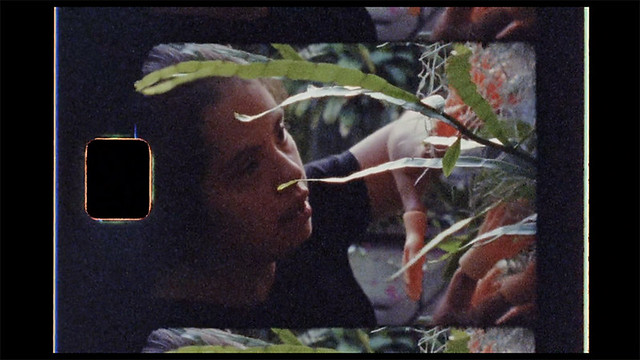 From the visual void we are introduced to a static noise. This static noise decked with subtitles is an omnipresent being, guiding us through Super Natural, a visual aural invitation to a group meditation called film watching. Shot in stunning backdrop of Madeira, Portugal, the film remind us that we are all connected in this world, the air we breathe in, the rock we are standing on, the fruit we eat, the various sea creatures, a little plastic bugs, our bodies, our imagination, our consciousness....
From the visual void we are introduced to a static noise. This static noise decked with subtitles is an omnipresent being, guiding us through Super Natural, a visual aural invitation to a group meditation called film watching. Shot in stunning backdrop of Madeira, Portugal, the film remind us that we are all connected in this world, the air we breathe in, the rock we are standing on, the fruit we eat, the various sea creatures, a little plastic bugs, our bodies, our imagination, our consciousness....
Shot in various medium - super 8, VR computer graphics, instagram images and using a group of people, some with disabilities and some not, Super Natural wants to place us in an environment not as strangers. It wants us to acknowledge that we are part of the ecosystem in the unstable world we are living in. Jácome and his collaborators use loose visual and words associations throughout with vivid colors and humor. The non-narrative images colliding but holds its shape together like a collage. Super Natural is a sensual meditation on human existence and connections with one another.
Geographies of Solitude - Jacquelyn Mills
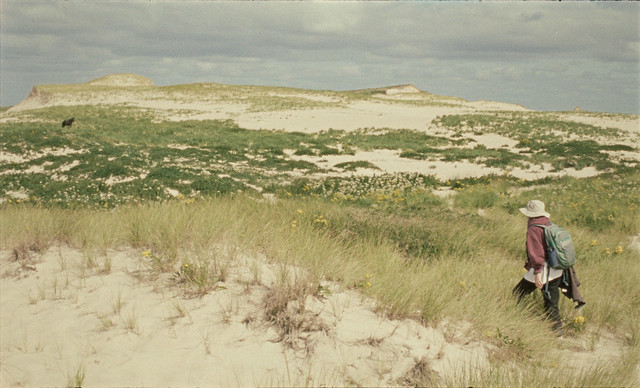 Zoe Lucas is a naturalist/environmentalist. She first came to Sable Island, a patch of land 20 miles long and one mile wide off the coast of Nova Scotia some 40 years ago to study wild horses living there and made it her home. She has been diligently and meticulously logging data, not only on the horse population, but also sorting through mountains of plastic debris being washed up ashore and cataloging them, leaving records of environmental impacts of the anthropocene age.
Zoe Lucas is a naturalist/environmentalist. She first came to Sable Island, a patch of land 20 miles long and one mile wide off the coast of Nova Scotia some 40 years ago to study wild horses living there and made it her home. She has been diligently and meticulously logging data, not only on the horse population, but also sorting through mountains of plastic debris being washed up ashore and cataloging them, leaving records of environmental impacts of the anthropocene age.
Filmmaker Jacquelyn Mills in collaboration with Lucas, lovingly documents all that a windswept remote island can offer - sand dunes, horses and seals, its intricate ecosystem. She also comments on the human footprints on environment through Lucas while capturing some of the most breathtakingly gorgeous images on 16mm film, plus naturally exposed footage only by moonlight and hand printed footage using natural surroundings. Here, tiny insects footsteps turn into music, grains of sand become twinkle of the stars, dead horse brings forth new vegetation. Geographies of Solitude is one of the loveliest feature debut in years.
Come Here - Anocha Swichakornpong
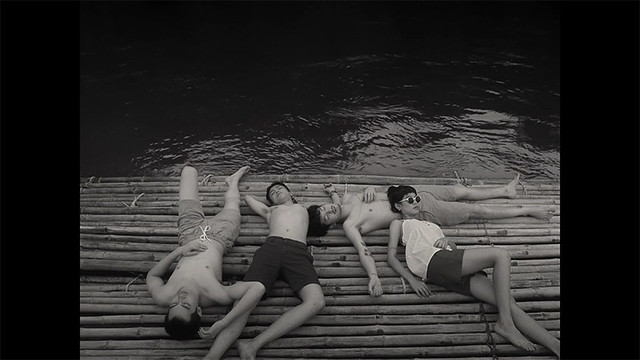 A group of young theater actors take a trip to Kanchanaburi, west of Thailand, where Death Railway, once a site for WWII atrocities where tens and thousands civilians and Allied POWs lost their lives in labor camps. But the museum is under renovation and closed. The group, consists of 3 boys and 1 girl, leisurely hangs out at the lake house, smoke weed, mimics animal noises and engage in mundane conversations.
A group of young theater actors take a trip to Kanchanaburi, west of Thailand, where Death Railway, once a site for WWII atrocities where tens and thousands civilians and Allied POWs lost their lives in labor camps. But the museum is under renovation and closed. The group, consists of 3 boys and 1 girl, leisurely hangs out at the lake house, smoke weed, mimics animal noises and engage in mundane conversations.
In a parallel action, a woman who is camping in the forest seems to be lost. Dazed and confused, she finds a stream, drinks the water then changes into a boy. Then we see the lakeside bungalow scene play out again on stage, with a scenery shot from the train out the stage window, moving us forward.
In her previous films, Suwichakornpong engaged us in a socio-political history buried underneath the lush forest of Thailand. Her approach is getting more and more abstract with each new film. Come Here, clocking at just over an hour, is like a puzzle piece with some of the vital pieces missing - what's the meaning of the transformation? Is the camper dreamed up by the girl by the lake or vice versa? How does a Bangkok's zoo closing figure into the story?
With the country's train and railway having imbued historical significance, Suwichakornpong's new film charts progress, nature, harkening back to animism, the younger generations collective historical amnesia, and the country's physical and spiritual transformation... in such a mysterious yet seductive manner. Watching Come Here is not frustrating- it provides you enough of threads, not at all in a teasing way, to decipher and mull over its sinuous connections and implications regarding history and it's thrilling.
If From Every Tongue It Drips - Sharlene Bamboat
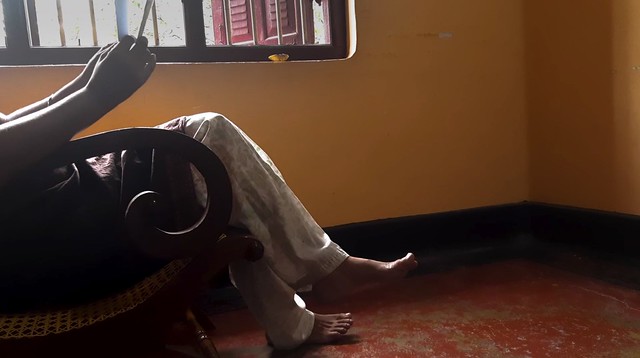 An intimate potrayal of a Tamil queer feminist activist and historian Ponni Arasu and her activist partner Sarala Emmanuel as they record their daily lives and discuss Indian history and quantum physics in relation to human connections and the state repressed desires. Shot in sticky, tropical climate of Sri Lanka, If From Every Tongue It Drips is sensory overload experience with constant chatters of people, birds, insects, mechanical humming, traffic, street noise, water lapping at the shore, and music. Bamboat uses discordant sound, highligting the film's multicultural everywhere-ness. Arasu, almost always a subject of attention, recites Rekhti poetry full of passion and sensuality about female desires for one another that went against British colonialism and its purification of the culture that dominated much of the British rule.
An intimate potrayal of a Tamil queer feminist activist and historian Ponni Arasu and her activist partner Sarala Emmanuel as they record their daily lives and discuss Indian history and quantum physics in relation to human connections and the state repressed desires. Shot in sticky, tropical climate of Sri Lanka, If From Every Tongue It Drips is sensory overload experience with constant chatters of people, birds, insects, mechanical humming, traffic, street noise, water lapping at the shore, and music. Bamboat uses discordant sound, highligting the film's multicultural everywhere-ness. Arasu, almost always a subject of attention, recites Rekhti poetry full of passion and sensuality about female desires for one another that went against British colonialism and its purification of the culture that dominated much of the British rule.
The film is fascinating, informal history lesson done through many languages and culture, all spoken and sang by Arasu who gives a queer perspective on history that is sorely needed to understand the cultural, political landscape of modern India and its feminist movement. The film also celebrates tender, proud and loving relationship the two women shares.
